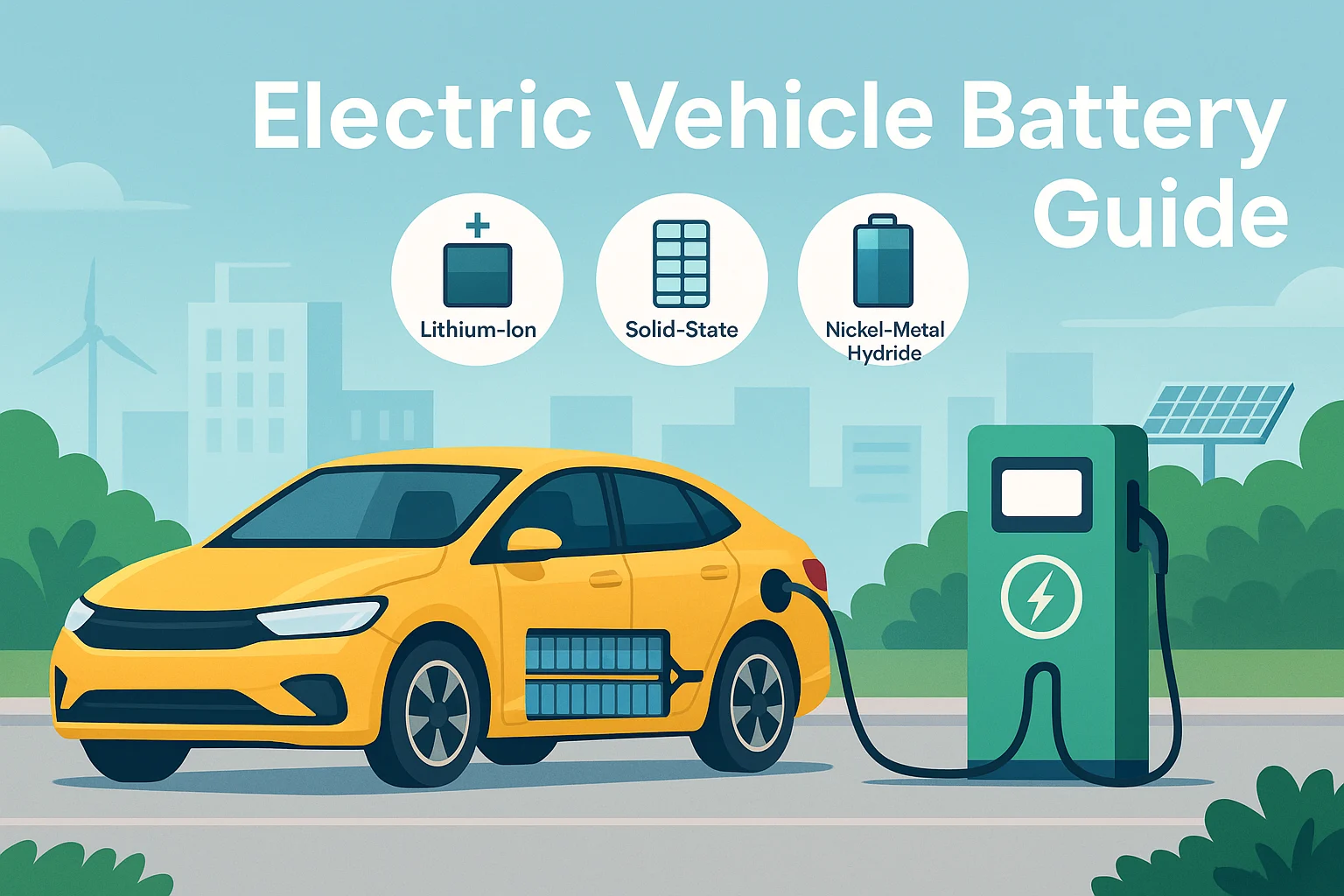Electric vehicles (EVs) are revolutionizing transportation, and at the heart of this shift lies the electric vehicle battery. Understanding battery types, their performance, cost, and longevity is crucial for anyone considering an EV. This guide covers everything you need to know about electric vehicle batteries to make an informed decision.
1. Introduction: Why Electric Vehicle Batteries Matter
The battery is the powerhouse of an electric vehicle, directly affecting its range, performance, and longevity. As EV adoption grows worldwide, so does the importance of understanding the technology that fuels them. From daily commutes to cross-country road trips, battery tech determines the convenience and feasibility of EV ownership.
2. Types of Electric Vehicle Batteries
Lithium-Ion (Li-ion)
- Most common type used in modern EVs
- High energy density, lightweight, and long cycle life
Solid-State Batteries
- Emerging technology
- Higher energy density and safety
- Still in development phase for mass-market vehicles
Nickel-Metal Hydride (NiMH)
- Commonly used in hybrid vehicles
- Less energy-dense than Li-ion, but highly durable
Lead-Acid Batteries
- Rarely used in modern EVs
- Low cost but heavy and short-lived
3. Battery Capacity and Range: What You Should Know
Battery capacity is measured in kilowatt-hours (kWh) and directly affects your vehicle's range.
- Larger batteries = longer range but higher cost
- Smaller batteries = lower range but more affordable and lightweight
- Real-world range can differ from rated range due to weather, terrain, and driving behavior
4. How Long Do Electric Vehicle Batteries Last?
EV batteries are built to last, often outliving the vehicle itself.
- Average lifespan: 8-15 years or 100,000-200,000+ miles
- Warranty: Most manufacturers offer 8-year/100,000-mile warranties
- Battery management systems (BMS) help extend battery life by preventing overcharging and deep discharging
5. Battery Charging: Tips to Preserve Health
Best Practices:
- Avoid frequent fast charging unless necessary
- Keep battery charge between 20%-80%
- Don't let battery sit at 0% or 100% for long periods
Charger Types:
- Level 1 (Home AC): Slow, best for overnight
- Level 2 (Home/Public): Fast and efficient for daily use
- DC Fast Charging (Public): Quick, but use sparingly to prevent wear
👉 Try our EV Charging Calculator to estimate your daily charging cost.
6. Cost of EV Battery Replacement and Maintenance
- Battery replacement: $4,000-$20,000 depending on vehicle
- Costs are expected to decline as technology advances
- Regular maintenance is minimal—EV batteries don't require oil changes
- Recycling and reuse programs are emerging to reduce environmental impact
7. Future of EV Batteries: What's Coming Next?
Innovations on the Horizon:
- Solid-state batteries: More efficient and safer
- Graphene batteries: Ultra-fast charging
- Wireless charging: Underway in select cities
Sustainability:
- Manufacturers are pushing for ethical sourcing of lithium, cobalt, and nickel
- Circular battery economy: Second-life batteries and recycling systems
8. How to Choose the Right EV Based on Battery Tech
When comparing electric vehicles, battery type and size should be a top consideration.
Key Factors:
- Daily driving distance
- Access to home/public chargers
- Budget vs performance preferences
👉 Use our EV Vehicle Compare Tool to find the best EV for your needs.
9. Verdict: Making an Informed Decision About EV Batteries
Choosing the right EV involves balancing range, battery size, cost, and charging options. With battery technology improving rapidly, owning an EV is becoming more practical and sustainable than ever before.
Educate yourself on battery types and usage habits to extend lifespan and performance. Whether you're a first-time EV buyer or looking to upgrade, understanding electric vehicle batteries is your first step toward a smarter drive.
🔧 FAQ: Electric Vehicle Batteries
Q1. Can EV batteries be repaired?
Yes, some components can be replaced or repaired, though it depends on the manufacturer and battery condition.
Q2. How much does it cost to replace an EV battery?
It ranges between $4,000 and $20,000 depending on the make, model, and battery size.
Q3. What happens when an EV battery dies?
It may enter a reduced-performance mode. Recharging or replacing the battery may be required.
Q4. Are EV batteries recyclable?
Yes, and recycling technology is improving. Some companies also repurpose used EV batteries for energy storage.
Q5. Do all EVs use the same type of battery?
No. Battery types vary by model, manufacturer, and year. Most modern EVs use lithium-ion, but that may change in the future.
Need help deciding which EV is right for you? Try our EV Vehicle Compare Tool or EV Charging Calculator to get started.
